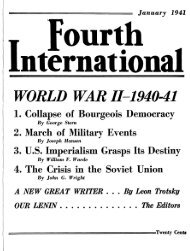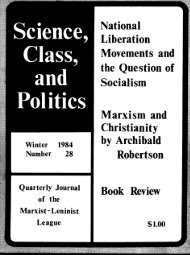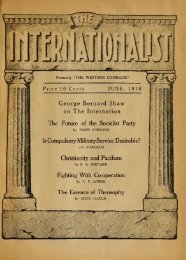The Stalin school of falsification - Marxists Internet Archive
The Stalin school of falsification - Marxists Internet Archive
The Stalin school of falsification - Marxists Internet Archive
Create successful ePaper yourself
Turn your PDF publications into a flip-book with our unique Google optimized e-Paper software.
<strong>Stalin</strong> School <strong>of</strong> Falsification -- Introduction<br />
anxious to join our party will increase enormously in the near future. <strong>The</strong> six months' period probation<br />
for the workers will not be able to dam back this throng, the more so as it will be easy for the petty<br />
bourgeois elements to become workers for the time being. If we are not to deceive ourselves and others,<br />
we must apply the definition <strong>of</strong> workers solely to those whose life has imparted to them a proletarian<br />
psychology, and who have worked for several years in shops or factories, not for the attainment <strong>of</strong><br />
outside aims, but in consequence <strong>of</strong> general social and economic conditions. To state the matter openly:<br />
it must be recognized that at the present time the proletarian party policy is determined not so much by<br />
its membership as by the unlimited and powerful authority <strong>of</strong> that thin layer which we may name the old<br />
party guard. "(International Press Correspondence, Vol.6, No.7, p.92.)<br />
It would <strong>of</strong> course be absurd to attribute to Lenin a superstitious faith in the flawlessness <strong>of</strong> this Old<br />
Guard. But that it was generally considered as one <strong>of</strong> the main guarantees against retrogression -- the Old<br />
Guard, that is, as a collective force -- is conclusively attested by precisely that "unlimited and powerful<br />
authority "it enjoyed in the party and through out the working class.<br />
In a country <strong>of</strong> some 150,000,000 population, the Old Guard <strong>of</strong> the revolutionary movement constituted<br />
only a very small group, small even in relation to the size <strong>of</strong> the Communist party. In the first years after<br />
the revolution, when the party had grown to between a third and a half a million members, the Old Guard<br />
rarely composed more than ten per cent <strong>of</strong> the ranks. Moreover, natural deaths and the fact that the "thin<br />
layer "contributed so many <strong>of</strong> its members to the fighters killed in the bitter civil war, continually<br />
reduced its numbers. <strong>The</strong> 1922 census <strong>of</strong> the party membership, with 886,313 men and women<br />
registered, showed that a total <strong>of</strong> 45,585 members had joined the party in 1917 or before, and that the<br />
party contained only 10,431 members who had joined in 1916 or before, that is, prior to the outbreak <strong>of</strong><br />
the March, 1917, Revolution. <strong>The</strong> 1925 census, registering 401,481 members, showed only 86,496 who<br />
joined the party not later than 1917, <strong>of</strong> whom only 8,249 <strong>of</strong> the pre-1917 period remained. (Jahrbuch fur<br />
Politik, Wirtschraft, Arbeiterbewegung, 1925-1926, p. 487. Berlin, 1926.) It would be safe to say, then,<br />
that ten years after the Bolshevik revolution, there were not more than 5,000 members left in the<br />
communist party who would properly fall into the category Lenin called the party's Old Guard.<br />
Before dealing with the. ultimate fate <strong>of</strong> this Old Guard, it is necessary to dwell briefly on the questions<br />
relating to it which were raised by Trotsky in 1928. Like Lenin, his appreciation <strong>of</strong> the Old Guard was<br />
unmingled with superstitious worship <strong>of</strong> it. It was already evident that the wearing years <strong>of</strong> supreme<br />
tension through which the revolution and its leaders had passed, years <strong>of</strong> defending an isolated workers'<br />
republic against almost insuperable internal difficulties and foreign pressure unrelieved by a successful<br />
revolution in the West, were having their effect on the people and on the leading stratum <strong>of</strong> the party.<br />
Conservatism, routine, adaptation, bureaucratism-all were producing significant changes in the political<br />
mentality <strong>of</strong> the party, from top to bottom. While underlining the tremendous importance <strong>of</strong> the Old<br />
Guard, Trotsky opened a drive for war upon bureaucratism and for pumping the restorative blood <strong>of</strong> the<br />
best forces in the new generation into the arteries <strong>of</strong> the old. Unless this were done, he emphasized, there<br />
was a danger <strong>of</strong> the degeneration <strong>of</strong> the old revolutionary group, a degeneration not unlike that <strong>of</strong> the old<br />
disciples <strong>of</strong> Marx and Engels-Adler, Bernstein, Guesde, Kautsky -- who had gradually abandoned their<br />
old positions.<br />
It is important to note that the first "struggle against Trotskyism" in the Russian Communist Party -- the<br />
so-called "literary discussion "<strong>of</strong> 1923 -- was directed at Trotsky's alleged slanders <strong>of</strong> the Old Guard. <strong>The</strong><br />
entire party apparatus was mobilized to "defend the Old Guard "and to smash Trotsky and his friends<br />
merely because they suggested the possibility, the danger <strong>of</strong> a degeneration <strong>of</strong> the ruling group.<br />
http://www.marxists.org/archive/trotsky/works/1937-st2/sf01.htm (3 <strong>of</strong> 11) [06/06/2002 15:05:49]

















